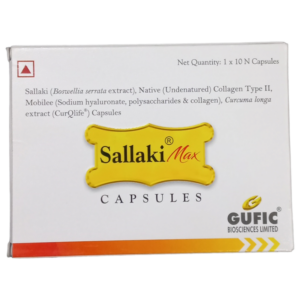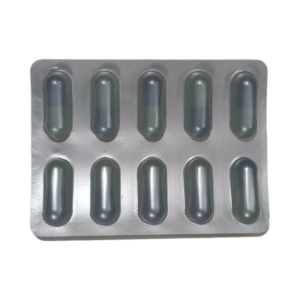AYURVEDIC + BOSWELLIA SERRATA + SODIUM HYALURONATE + CURCUMA LONGA (CURCUMIN) EXTRACT + COLLAGEN TYPE-2
Ayurvedic: Ayurvedic medicine is a traditional system of medicine that originated in India thousands of years ago. It is based on the principles of balancing body, mind, and spirit to promote health and prevent disease. Ayurvedic medicine utilizes a variety of herbs, minerals, and other natural substances to address various health conditions.
Use: Ayurvedic medicine is used to treat a wide range of ailments, including digestive disorders, hormonal imbalances, respiratory problems, musculoskeletal issues, skin conditions, and mental health disorders. It aims to promote overall well-being and harmony within the body.
Mechanism of Action: Ayurvedic medicines work through various mechanisms depending on the specific herbs or substances used. These medicines often contain active compounds that interact with the body’s systems to bring about therapeutic effects. Some herbs may have antioxidant, anti-inflammatory, antimicrobial, or hormone-regulating properties. Ayurvedic medicine also emphasizes promoting optimal digestion and absorption of nutrients, as proper digestion is considered vital for overall health.
Dose: The dosage of Ayurvedic medicine can vary depending on the specific herb or formula being used, as well as the individual’s age, health condition, and other factors. It is generally recommended to follow the instructions provided by a qualified Ayurvedic practitioner or the product’s packaging. Ayurvedic medicines are available in various forms, including capsules, tablets, powders, and oils.
Side Effects: While Ayurvedic medicines are generally considered safe when used appropriately, some formulations may have potential side effects. These can range from mild gastrointestinal disturbances (such as nausea or diarrhea) to allergic reactions. It is important to consult with a qualified practitioner and disclose any pre-existing health conditions or medications being taken to minimize the risk of adverse effects.
It is worth noting that the regulation and quality control of Ayurvedic medicines can vary depending on the country. Some Ayurvedic products have been found to contain heavy metals or other impurities, emphasizing the importance of obtaining them from reputable sources and ensuring proper manufacturing standards.
Boswellia Serrata: Boswellia serrata, also known as Indian frankincense, is an herbal supplement derived from the resin of the Boswellia tree. It has been used for centuries in traditional medicine to manage various health conditions.
Use: Boswellia serrata is commonly used for its anti-inflammatory properties. It is primarily used to treat chronic inflammatory conditions such as osteoarthritis, rheumatoid arthritis, asthma, and inflammatory bowel disease. It may also be used to alleviate symptoms of other conditions like bronchitis, bursitis, tendinitis, and ulcerative colitis.
Mechanism of Action: The main active component in Boswellia serrata is thought to be boswellic acid, which inhibits the production of inflammatory enzymes called leukotrienes. By reducing inflammation, it helps to relieve pain and improve symptoms associated with inflammatory diseases.
Dose: The recommended dosage of Boswellia serrata may vary depending on the brand or specific formulation. As a general guideline, a typical dose for adults is 300-400 mg, three times per day. However, it is always best to follow the instructions provided by the manufacturer or consult with a healthcare professional for proper dosing.
Side Effects: Boswellia serrata is generally considered safe for most people when taken at recommended doses. However, some individuals may experience mild side effects such as nausea, diarrhea, stomach pain, or skin rash. Rarely, it may cause more severe allergic reactions or liver problems. It is advisable to discontinue use if any adverse effects occur and consult a healthcare professional.
It is important to note that although Boswellia serrata is widely available as a supplement, it is not regulated by the FDA (Food and Drug Administration) in the same way as prescription drugs. Therefore, it is crucial to purchase from reputable sources and discuss its use with a healthcare professional, especially if you have any underlying health conditions or are taking other medications.
Sodium Hyaluronate: Sodium Hyaluronate is a medication used primarily for the treatment of joint disorders such as osteoarthritis. It is a form of hyaluronic acid, which is a natural substance found in the body that helps lubricate and cushion the joints. Sodium Hyaluronate is available in various forms, including injections and topical applications.
The mechanism of action of Sodium Hyaluronate involves restoring the viscosity and elasticity of synovial fluid, which helps reduce joint pain and improve mobility. It also acts as a protective barrier on the joint surface, reducing friction and preventing further damage.
The dose of Sodium Hyaluronate depends on the specific condition being treated and the formulation of the medication. Injections are usually administered by a healthcare professional and may be given as a series of weekly or monthly doses. Topical applications are typically used as needed and should be applied according to the instructions provided.
Common side effects of Sodium Hyaluronate injections may include mild pain or swelling at the injection site. Some individuals may experience headache, dizziness, or nausea. Rarely, patients may develop an allergic reaction, which could include symptoms such as rash, itching, or difficulty breathing.
When using topical Sodium Hyaluronate, some people may experience skin irritation or redness. If these side effects persist or worsen, it is advisable to consult a healthcare professional.
It is important to note that Sodium Hyaluronate may not be suitable for everyone. Individuals with a known allergy to hyaluronic acid or any other ingredient present in the medication should avoid its use. It is recommended to consult a healthcare professional before starting Sodium Hyaluronate to determine if it is the appropriate treatment option for your specific condition.
Curcuma Longa (curcumin) Extract: Curcuma Longa, also known as curcumin extract, is a natural compound derived from the plant Turmeric. It has been used for centuries in traditional medicine for its numerous health benefits. Curcumin is well-known for its strong anti-inflammatory and antioxidant properties.
Curcumin is primarily used as a dietary supplement to promote overall health and well-being. It is believed to help with a variety of conditions, including arthritis, heart disease, cancer, and gastrointestinal disorders. Additionally, curcumin has neuroprotective properties and is being investigated for its potential in treating Alzheimer’s disease.
The exact mechanism of action of curcumin is not fully understood. However, it is known to inhibit various inflammatory pathways in the body, including the activation of inflammatory molecules and the regulation of transcription factors. It also exhibits antioxidant activity by scavenging harmful free radicals, thus reducing oxidative stress in the body.
The recommended dose of curcumin extract varies depending on the specific product and individual needs. Typically, a dose of 500-2000 mg per day is considered safe for most adults. However, it is advisable to consult with a healthcare professional for appropriate dosage instructions.
Generally, curcumin extract is well-tolerated when taken in recommended doses. However, some individuals may experience mild side effects such as nausea, diarrhea, or stomach upset. High doses or long-term use of curcumin may also cause liver problems in rare cases. It is important to note that curcumin may interact with certain medications, so it is essential to inform your healthcare provider about all the medications you are taking before starting curcumin supplementation.
In conclusion, curcumin extract derived from Curcuma Longa is a popular dietary supplement known for its potent anti-inflammatory and antioxidant properties. It is used to support overall health and may be beneficial in managing various conditions. However, it is essential to consult with a healthcare professional for proper dosage guidelines and to ensure safety and effectiveness.
Collagen Type-2: Collagen Type-2 is a drug that is primarily used for the treatment of osteoarthritis, a degenerative joint disease. It is derived from the cartilage of chickens or cows.
The mechanism of action of Collagen Type-2 involves stimulating the production of new collagen in the joints. Collagen is a protein that provides structural support to the cartilage, tendons, ligaments, and other connective tissues in the body. In osteoarthritis, the cartilage becomes damaged and worn down, causing pain and inflammation. Collagen Type-2 supplementation aims to restore the lost collagen and improve joint function.
The recommended dose of Collagen Type-2 varies depending on the brand and formulation. It is commonly taken orally as a dietary supplement or in the form of capsules or tablets. It is important to follow the instructions provided by the manufacturer or consult with a healthcare professional for the appropriate dosage.
As a dietary supplement, Collagen Type-2 is generally considered safe with minimal side effects. However, some individuals may experience mild gastrointestinal discomfort, such as bloating or diarrhea, when starting the treatment. Allergic reactions to collagen can also occur in rare cases, which may manifest as itching, swelling, or difficulty breathing. In such instances, immediate medical attention should be sought.
It is crucial to note that Collagen Type-2 should not be used as a substitute for conventional medical treatment. It is advisable to consult with a healthcare professional before using Collagen Type-2 or any other dietary supplement, especially if you have any pre-existing medical conditions or are taking other medications.


